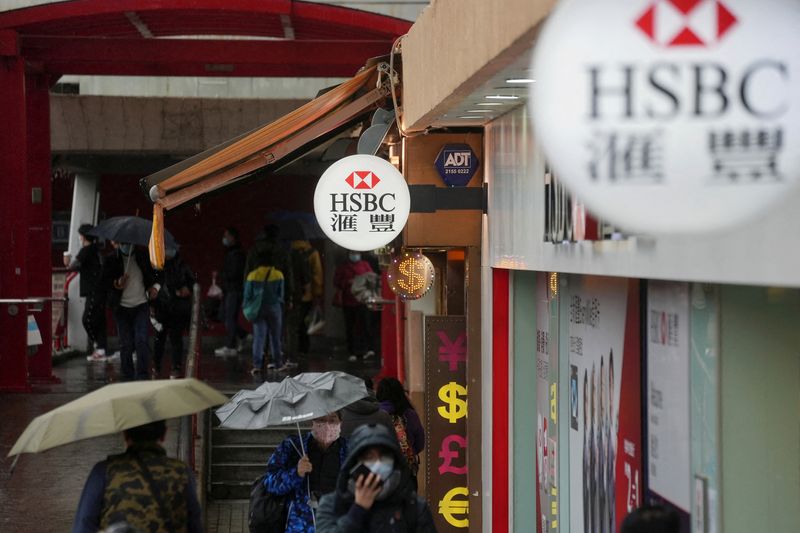By Tommy Wilkes
LONDON (Reuters) -Four major banks, including Standard Chartered (OTC:SCBFF) Plc and HSBC Plc, have quit a United Nations-backed initiative to scrutinise climate targets set by corporations, according to people familiar with the matter.
The lenders have abandoned efforts for the Science Based Targets Initiative (SBTi) to validate their goals because of concerns it could hinder their ability to continue financing fossil fuels, the sources said.
Some of the banks, which also include Societe Generale (OTC:SCGLY) SA and ABN Amro Bank NV, have also raised concerns that SBTi's greenhouse gas emissions target-setting demands are too hard to meet, the sources added.
To justify their departures, which happened separately and over the past year, some of the banks cited their membership of another United Nations-backed grouping, the Net-Zero Banking Alliance (NZBA), which is less prescriptive and allows lenders to continue to finance fossil fuels as long as they make progress on their emissions. Many lenders say they should finance fossil fuels as long as economies depend on them.
The departure of the four banks casts a shadow over the world's most widely adopted standard for curbing greenhouse gas emissions.
Launched as a non-profit, SBTi has certified that emissions targets of nearly 4,000 companies globally are aligned with the intergovernmental Paris agreement to limit global warming to 1.5 degrees Celsius.
SBTi unveiled plans this year for a new standard that will apply specifically to financial institutions as early as 2024. It will require banks and asset managers not to finance new fossil fuel projects.
This proved too much for Standard Chartered, which wants to continue this business in developing markets. A spokesperson for the bank confirmed it had left the validation process and said SBTi's proposed standard failed to consider adequately "the transition (away from fossil fuels) of our clients and markets".
The spokesperson added that Standard Chartered was seeking alternative third-party validation of its climate targets and that it was setting science-based targets through the NZBA.
An HSBC spokesperson said the bank was setting its emissions targets in line with NZBA guidance. A spokesperson for Societe Generale said the French bank was also committed to setting its emissions targets in line with NZBA's methodology.
A spokesperson for ABN Amro said the Dutch lender remained an NZBA member after leaving SBTi.
An SBTi spokesperson told Reuters that, following feedback, SBTi changed some of its requirements. It will allow banks to continue to finance some fossil fuel projects as long as they pertain to emissions targets that have to be met near-term. It will still require them to cease the financing of fossil fuel projects that would weigh on their longer-term emissions targets.
"We cannot limit global warming to 1.5 degrees Celsius and mitigate the risks of climate breakdown without reducing our dependence on fossil fuels," SBTi said in a statement.
To be sure, most major European banks that signed up to SBTi remain members. Credit Agricole (OTC:CRARY), ING, BBVA (BME:BBVA) and Swedbank told Reuters they remained committed to SBTi validating their emissions targets.
SBTi has already approved some NatWest, Commerzbank (ETR:CBKG) and Raiffeisen targets. BNP Paribas (OTC:BNPQY) did not respond to requests for comment about its SBTi status.
No major U.S. bank has joined SBTi, opting instead for NZBA's easier-to-meet standards.
CRACKS SPREADING
In a sign that cracks between SBTi and financial firms could spread, a spokesperson for Allianz (ETR:ALVG) said the German insurance giant had also quit, without providing a reason.
The spokesperson said Allianz was committed to the target-setting methodology of the Net-Zero Asset Owners Alliance, another U.N. backed climate coalition it is a member of. This year, Allianz quit the Net-Zero Insurance Alliance amid concerns that the climate coalition was at risk of violating antitrust law.
It is not the first time that banks have sought to lower the bar on the emissions they help finance. Reuters reported in July that lenders working to develop global standards on accounting for greenhouse gases in bond or stock sale underwriting voted to exclude most of these emissions from their own carbon footprint.

Pietro Rocco, head of green finance at the Carbon Trust, which advises firms on decarbonising, said he was concerned that leaving SBTi would lead to less ambitious emissions targets.
"They hold you to a higher standard than NZBA. SBTi shows you haven't gone off on your own, it's been marked," Rocco said.